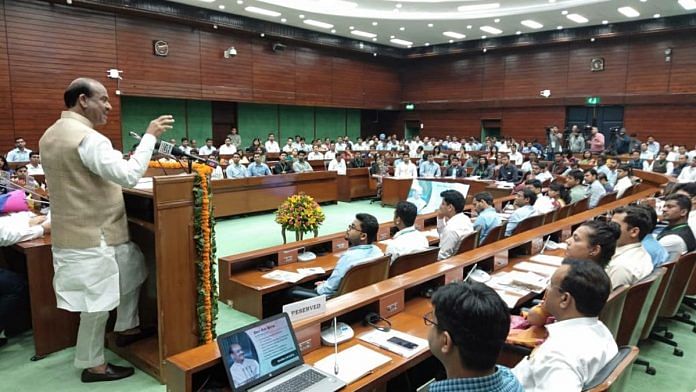Not so long ago, Prime Minister Narendra Modi had ridiculed India’s civil servants in Parliament when he questioned whether the government should be run by ‘babus’, a euphemism for bureaucrats. It is ironic to see the PM now, addressing the very same ‘babus’, the district magistrates of India.
If one thing the Covid-19 crisis has signalled, it is the complete and colossal failure of the institution of the Indian government. From ‘Minimum Governance’, a slogan coined by PM Modi in 2014, to ‘No Governance’ in 2021. The Modi government at the Centre has not only failed in anticipating the second wave but it continues to flounder and remains absolutely clueless about handling the situation.
It is not hard to see the reason behind this — a systematic neglect of the steel frame of India, repeatedly demeaned and undermined.
Also read: Not much enthusiasm for Modi govt’s latest IAS lateral entry push, just about 1,200 apply
What civil servants now stand for
Some may argue that PM Modi prefers to work directly through bureaucrats, overriding his ministers. But the fact remains that he prefers to work with a ‘select’, handful of bureaucrats, not the system of civil services. In this light, even the so-called reforms introduced by the Modi government are not systemic in nature, but are designed to rope in ‘committed’ officials, not independent-thinking ones.
The system of accountability for civil servants to the elected representatives is based on two assumptions, which are both inherently flawed.
The first assumption is that public representatives would be motivated to work out of a sense of public service. But the reality is that political activity has turned into a commercial enterprise. People invest huge amounts of resources in order to secure election victories. All political parties of India are now populated with petty, medium contractors, not leaders oriented towards public service.
The second assumption is that people’s representatives will actually represent the people who elect them. In a situation where the spirit of service is gone, there is now a desire to ‘profit’ from an earlier investment. Therefore, representatives are more likely to prioritise commercial interests, rather than the needs of the public.
The result of the supremacy of elected leaders is that administrative officers have been marginalised by commercial interests, at all levels of administration. This has had catastrophic consequences, as we are now witnessing.
Also read: IAS officer Iqbal Chahal, BMC chief & Mumbai’s Covid hero, was once shunted out by Modi govt
Modi govt weakening civil services
One of the first actions of the Modi government was to remove the mandatory requirement of sanctions to prosecute civil servants, a feature that stripped any sense of legal protection available to them. This was followed by the removal of so-called ‘Red Beacons’, the only vestige of authority and prestige that was available to civil servants, in the field.
In the absence of prestige and authority, officers lose their initiative and drive. In various state governments, the office of district magistrate has been reduced to a glorified post office that receives instructions from various government departments and passes them on to field officers.
The departments are headed by ministers. It is no secret in India that most district-level postings of departmental officers are made on the basis of ‘extra-curricular’ considerations — not factors like merit and efficiency. The offices of the chief secretaries and secretaries also no longer enjoy the protection and prestige of the political chief executive they were once used to. These are also largely appointed on the basis of extra-curricular considerations.
Most administrative powers of departmental heads and field heads have been usurped by the political executive. This has dented the principle of ‘single line of command’. In the absence of authority, and in light of the ready availability of departmental ministers, the departmental secretaries and district authorities have been rendered toothless.
The effectiveness of administrators has all but vanished, thanks to various policy decisions taken over the past several decades.
The judicial institutions of the country also derive a lot of pleasure in denigrating the civil service, often humiliating senior officers deliberately. It was extremely disheartening to note that during the recent crisis of oxygen availability in Delhi, the senior-most government officers spent several days waiting in various courts of law, whereas their time could have been better utilised in trying to find solutions to the problem.
The result of all this denigration and removal of constitutional protections is that the civil servants now fail to speak their minds when it is required the most. In the absence of protection and freedom to act, one would get only supplicants and sycophants, not clear-headed and dispassionate advisors and executors of political will.
It is paramount, in the interest of the people of India, that the constitutional protections available to civil servants envisaged by India’s founding fathers under the Constitution are restored at the earliest.
Samir Singh Chandel is an IAS officer of the 1989 batch, who took voluntary retirement as a Principal Secretary, Govt of Rajasthan. Views are personal.



